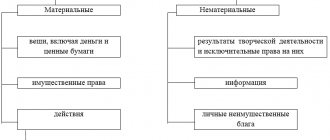Jurisdiction of the case in the arbitration process
The jurisdiction of the arbitration court is included in the concept of its competence and is important. Jurisdiction allows you to establish the range of cases that the law refers to the consideration and resolution of the AC. Jurisdiction distributes cases to various levels of the arbitration judicial system. The law establishes different types of jurisdiction, the initial classification is related to the determination of the generic and territorial characteristics of this legal phenomenon, changes to the existing algorithm for the distribution of disputes are allowed through decisions of legislators.
What cases are within the jurisdiction of arbitration courts?
The jurisdiction of arbitration courts over cases is determined by Art. 22 of the Arbitration Procedure Code of the Russian Federation through their competence in the field of administration of justice.
This article is based on the provisions of Art. 127 of the Constitution of the Russian Federation and Art. 4 and 5 of the Federal Constitutional Law “On Arbitration Courts in the Russian Federation”, according to which the jurisdiction of arbitration courts includes consideration of economic disputes and other cases in the field of economic and other business activities. This differentiates the competence of arbitration courts and other bodies, including courts of general jurisdiction.
In Art. 22 of the Arbitration Procedure Code of the Russian Federation defines the subject composition of participants in legal relations,
from which a dispute may arise within the jurisdiction of the arbitration court. These are, first of all, legal entities and citizens carrying out entrepreneurial activities without forming a legal entity and having the status of an individual entrepreneur acquired in the manner prescribed by law.
At the same time, the Arbitration Procedure Code of the Russian Federation proceeds from the concept of a legal entity, defined in Art. 48 and other articles of the Civil Code of the Russian Federation, and considers both commercial and non-profit organizations as subjects of legal relations that may give rise to a dispute within the jurisdiction of the arbitration court (Article 50 of the Civil Code of the Russian Federation). A citizen as a participant in a dispute within the jurisdiction of the arbitration court is recognized as such if the conditions provided for in Art. 23 Civil Code of the Russian Federation. Such conditions are the implementation by a citizen of entrepreneurial activity without forming a legal entity and the state registration of this citizen as an individual entrepreneur.
The arbitration court also has jurisdiction over cases of economic disputes between the Russian Federation and the constituent entities of the Russian Federation, as well as between the constituent entities of the Russian Federation (clause 2, part 1, article 22 of the Arbitration Procedure Code of the Russian Federation).
In cases established by the Arbitration Procedure Code of the Russian Federation and other federal laws, the arbitration court has jurisdiction over cases on economic disputes and other cases involving entities that are not legal entities and citizens who do not have the status of an individual entrepreneur (for example, on appealing a refusal of state registration).
The arbitration court considers cases within its jurisdiction involving organizations and citizens of the Russian Federation, as well as foreign organizations, organizations with foreign investments, international organizations, foreign citizens, stateless persons engaged in entrepreneurial activities, unless otherwise provided by an international treaty of the Russian Federation.
One of the criteria for classifying cases under the jurisdiction of the arbitration court is the nature of the legal relationship, which is defined in Art. 22 Arbitration Procedure Code of the Russian Federation. The arbitration court, in particular, has jurisdiction over economic disputes arising from civil legal relations. Economic disputes arising from civil legal relations represent the most typical and most common category of cases considered by the arbitration court. In addition, the arbitration court has jurisdiction over economic disputes arising from administrative legal relations, that is, relations based on the administrative or other power subordination of one party to the other.
Economic disputes resolved by the arbitration court, in particular, include disputes (Part 2 of Article 22 of the Arbitration Procedure Code of the Russian Federation):
- about disagreements under an agreement, the conclusion of which is provided for by law or the submission of disagreements under which to the resolution of an arbitration court has been agreed upon by the parties;
- about changes in conditions or termination of contracts;
- about non-fulfillment or improper fulfillment of obligations;
- on recognition of property rights;
- on the claim by the owner or other legal owner of property from someone else’s illegal possession;
- about a violation of the rights of the owner or other legal owner, not related to deprivation of possession;
- on compensation for losses;
- on invalidation (in whole or in part) of non-normative acts of state bodies, local governments and other bodies that do not comply with laws and other regulatory legal acts and violate the rights and legitimate interests of organizations and citizens:
- on the protection of honor, dignity and business reputation;
- on recognizing as not subject to execution a writ of execution or another document, according to which the collection is carried out in an indisputable (non-acceptance) manner;
- on appealing the refusal of state registration or evasion of state registration within the established period of an organization or citizen and in other cases when such registration is provided for by law;
- on the collection of fines from organizations and citizens by state bodies, local self-government bodies and other bodies exercising control functions, unless federal law provides for an indisputable (unaccepted) procedure for their collection;
- on the return from the budget of funds written off by bodies exercising control functions in an indisputable (non-acceptance) manner in violation of the requirements of the law or other regulatory legal act.
The arbitration court also considers other cases, including (part 3 of article 22 of the Arbitration Procedure Code of the Russian Federation):
- on the establishment of facts relevant to the emergence, change or termination of the rights of organizations and citizens in the field of entrepreneurial and other economic activities (hereinafter referred to as the establishment of facts of legal significance);
- on the insolvency (bankruptcy) of organizations and citizens. This list is not exhaustive, since federal laws may include other cases within the jurisdiction of the arbitration court.
Rules and types of jurisdiction
Types of jurisdiction delimit the jurisdiction of the RF CA. This is necessary in order to correctly establish the court authorized to consider controversial legal relations.
Generic jurisdiction serves as a criterion for delimiting disputes between ACs belonging to different levels. There is a general standard according to which cases with the jurisdiction of the AC are resolved by the relevant body of the constituent entities of the Russian Federation. Exceptions to the general standard of review are disputes that must be considered by the highest-level CA and federal district courts.
What applies to patrimonial jurisdiction?
The concept of generic jurisdiction establishes for interested parties the level of the court that is considering a particular case. There is a general rule for cases to be considered by the court as the first instance. The courts are such courts;
- republics;
- edges;
- regions;
- cities of federal significance;
- courts of districts with autonomy.
The list is clear, but exceptions are situations when the consideration of disputes falls within the powers of the highest level courts under Art. 34 APK.
Commentary to Art. 34 Arbitration Procedure Code of the Russian Federation
1. In contrast to the institution of jurisdiction, which is necessary to determine the competent jurisdictional body to resolve a particular legal matter, the institution of jurisdiction distinguishes cases within the jurisdiction of arbitration courts between various parts of the unified system of arbitration courts. In other words, according to the rules of jurisdiction, among all the arbitration courts of the Russian Federation, a specific arbitration court is determined that has the competence to resolve cases as a court of first instance. The arbitration process is characterized by two types of jurisdiction - generic and territorial.
In Art. 34 of the APC formulate the rules of generic jurisdiction of cases within the jurisdiction of arbitration courts. According to the rules of generic jurisdiction, it is determined at what level the arbitration court has the right to consider a particular case. Since the criterion of generic jurisdiction is the type (category) of the case, it received the name generic jurisdiction. It is the generic jurisdiction that makes it possible to distinguish cases within the jurisdiction of the arbitration court, depending on their type, between arbitration courts of various levels, links in the system of arbitration courts.
According to the general rule of patrimonial jurisdiction, formulated in Part 1 of Art. 34 of the Arbitration Procedure Code, cases within the jurisdiction of the arbitration court are considered at first instance by the arbitration courts of the constituent entities of the Russian Federation. Arbitration courts of the constituent entities are the main link in the judicial arbitration system, since courts at this level have the right to consider at first instance almost all categories of cases within the jurisdiction of the arbitration court, with the exception of cases within the jurisdiction of the Supreme Arbitration Court of the Russian Federation.
In accordance with Art. 3 of the Federal Law on Arbitration Courts in the Russian Federation, arbitration courts of constituent entities of the Russian Federation are arbitration courts of republics, territories, regions, cities of federal significance, autonomous regions, autonomous districts. In terms of content and scope of competence, all arbitration courts of the constituent entities of the Russian Federation are equal to each other.
An exception to the rule formulated in Part 1 of Art. 34 of the APC, is to assign certain categories of cases to the jurisdiction of the Supreme Arbitration Court of the Russian Federation (see commentary on Part 2 of Article 34 of the APC) and to the jurisdiction of federal arbitration courts of districts (see commentary to Part 3 of Article 34 of the APC).
The criterion for delimiting generic jurisdiction is the type of case, which presupposes a special subject of the dispute and (or) a special subject composition of the dispute.
Based on the general rule of generic jurisdiction, we can conclude that only arbitration courts of appeal do not have the powers of courts of first instance, their purpose is solely to verify, in an appellate manner, judicial acts adopted by arbitration courts of constituent entities of the Russian Federation, and therefore, the rules of jurisdiction do not apply to them .
2. In part 2 of Art. 34 of the Arbitration Procedure Code defines the competence of the Supreme Arbitration Court of the Russian Federation to consider cases within the jurisdiction of the arbitration court at first instance. Its jurisdiction includes categories of cases directly designated in this norm. The range of these cases is limited to three categories of cases and is not subject to broad interpretation. This means that all other cases within the jurisdiction of the arbitration court, regardless of the subject of the dispute or the subject composition, are considered by the arbitration courts of the constituent entities of the Russian Federation.
Article 29 of the Arbitration Procedure Code refers to the competence of arbitration courts cases of challenging normative and non-normative legal acts affecting the rights and legitimate interests of the applicant in the field of business and other economic activities. Depending on the level of the authority that issued the contested legal act, its jurisdiction is determined. The Supreme Arbitration Court of the Russian Federation has jurisdiction only over cases of challenging legal acts of the highest authorities of the Russian Federation affecting the rights and legitimate interests of the applicant in the field of business and other economic activities. When challenging a normative legal act, the Supreme Arbitration Court of the Russian Federation is competent to resolve such a dispute if the contested act was adopted by the President of the Russian Federation, the State Duma of the Russian Federation, the Federation Council of the Russian Federation, the Government of the Russian Federation and federal executive authorities. All other cases of challenging normative acts within the jurisdiction of arbitration courts are within the jurisdiction of arbitration courts of constituent entities of the Russian Federation.
When challenging a non-normative legal act, the Supreme Arbitration Court of the Russian Federation is competent to resolve such a case if the contested act was adopted by the President of the Russian Federation, the State Duma of the Russian Federation, the Federation Council of the Russian Federation, the Government of the Russian Federation and the Government Commission for Control of Foreign Investments in the Russian Federation. Cases challenging non-normative legal acts of other government bodies are subject to the jurisdiction of arbitration courts of constituent entities of the Russian Federation.
Article 124 of the Civil Code allows the participation of government entities as subjects of civil circulation: the Russian Federation, constituent entities of the Russian Federation and municipal entities. In accordance with Art. 125 of the Civil Code, on behalf of the Russian Federation and constituent entities of the Russian Federation, by their actions, public authorities can acquire and exercise property and personal non-property rights and obligations, and act in court within the framework of their competence established by acts defining the status of these bodies. According to Art. 27 of the Arbitration Procedure Code, arbitration courts have jurisdiction, in particular, over economic disputes between the Russian Federation, constituent entities of the Russian Federation and municipalities.
The Supreme Arbitration Court of the Russian Federation has jurisdiction only over economic disputes between the Russian Federation and the constituent entities of the Russian Federation and disputes between the constituent entities of the Russian Federation. This category of disputes may include, for example, disputes related to the delimitation of state ownership rights to real estate and other property, or cases of challenging legal acts of state authorities of constituent entities of the Russian Federation that violate the rights and interests of the Russian Federation related to the exercise of its rights as an owner.
———————————
See, for example: Resolution of the Presidium of the Supreme Arbitration Court of the Russian Federation dated November 22, 2005 N 10163/05, Resolution of the Presidium of the Supreme Arbitration Court of the Russian Federation dated November 22, 2005 N 10165/05.
Economic disputes involving municipalities, regardless of the participation of the Russian Federation and (or) constituent entities of the Russian Federation in them, are subject to the jurisdiction of arbitration courts of constituent entities of the Russian Federation in accordance with the rules of Art. Art. 35, 36, 37, 38 AIC. For example, disputes between the Russian Federation and the federal city of Moscow regarding rights to real estate, which, when delineating state property, was transferred to the city of Moscow as municipal property, are subject to consideration by an arbitration court in accordance with the jurisdiction established by Part 1 of Art. 38 APK. These disputes, being essentially disputes over municipal property, cannot be classified as cases specified in clause 3, part 2, art. 34 APK. The jurisdiction of these disputes involving the Russian Federation and the federal city of St. Petersburg is determined in a similar manner.
It should also be borne in mind that if the real estate, about the rights to which a dispute has arisen between the specified public legal entities, is assigned to other persons by property law or is in their actual possession, the dispute about the rights to such property on the basis of Part 1 of Art. . 38 of the APC is subject to consideration by the arbitration court of a constituent entity of the Russian Federation (clause 2 of the Resolution of the Plenum of the Supreme Arbitration Court of the Russian Federation dated October 12, 2006 N 54 “On some issues of jurisdiction of cases on claims for rights to real estate”).
3. According to Part 3 of Art. 34 of the APC, the only category of cases considered by federal arbitration courts of districts as courts of first instance are cases of awarding compensation for violation of the right to trial within a reasonable time or the right to execution of a judicial act within a reasonable time. The commented norm follows from the provisions of Art. 3 Federal Law of April 30, 2010 N 69-FZ “On compensation for violation of the right to legal proceedings within a reasonable time or the right to execution of a judicial act within a reasonable time.”
From the analysis of Part 3 of Art. 34 of the APC, we can conclude that the competent court when considering this category of cases will be the federal arbitration court of the district in whose jurisdiction the arbitration court that considered the relevant case is located, or the body, organization, official entrusted with the obligation to execute relevant judicial act.
At the same time, the legislator does not indicate to which court an application for compensation should be filed if the interested person believes that during the consideration of the case by the federal arbitration court of the district or the Supreme Arbitration Court of the Russian Federation, his right to legal proceedings within a reasonable time was violated. When determining the competent court in this case, one should, in our opinion, proceed from the provisions of Part 4 of Art. 4 Federal Law dated April 30, 2010 N 69-FZ, according to which the requirement to award compensation for violation of the right to trial within a reasonable time can be set out in an application for review of judicial acts in the manner of supervision (a similar rule is contained in paragraph 2 of Part 2 of Art. 292 Arbitration Procedure Code of the Russian Federation). Thus, in these cases, interested parties can submit a demand for compensation for violation of the right to legal proceedings within a reasonable time, together with an application for review of judicial acts in the manner of supervision, to the Presidium of the Supreme Arbitration Court of the Russian Federation.
What is meant by alternative jurisdiction?
Alternative jurisdiction allows the interested party to choose a court of territorial jurisdiction to consider the dispute. But for choice there must be accompanying conditions. The plaintiff has the right to choose the court where the claim is filed. And the CA does not have the right to deny him the right to protect his property interests or not accept his application.
PLEASE NOTE: noteworthy art. 39 of the APC, according to which the court has the right to transfer the consideration of the case to another court if a different jurisdiction is revealed during the trial. The Court of Justice, to which the case is transferred, does not have the right to refuse to consider it. The rule of law does not specify whether the court that initially considers a controversial case is obliged to transfer it for consideration to another court.
The procedure for alternative jurisdiction establishes: in order to consider a case at the choice of the plaintiff, the presence of accompanying conditions is necessary. The general standard of jurisdiction establishes that disputes in the arbitration court are considered at the location of the defendant, both actual and official.
An alternative type of jurisdiction means that the dispute is filed in any of the territorial courts if the following circumstances exist:
- at the time of filing the claim, the location of the debtor is unknown to the second party;
- the claim is filed against a company whose branches or representative offices are located outside the main office;
- Previously, the parties to the disputed legal relationship drew up an agreement, which indicated the place of fulfillment of mutual obligations;
- the claim is directed towards several defendants, their location does not fall under the rules of territorial jurisdiction;
- the defendant in the controversial case is a representative of a foreign state; he has property on the territory of the Russian Federation;
- the dispute concerns compensation for losses incurred as a result of a maritime accident, compensation of funds for carrying out a rescue operation on the water.
The plaintiff has the right to choose the territorial court that is more convenient for him. If he does not know where the other party, the debtor, is located at the time of filing the claim, the plaintiff has the right to seek protection of the violated legal right at the location of the property, or the last place of residence of the guilty party. The Administration of the Russian Federation cannot refuse an interested person submitting applications in such an algorithm, but provided that the document is drawn up according to the rules of Art. 125 of the APC, a receipt is attached to the claim proving payment of the state duty.
Site Expert
Fasakhovva Elena Alexandrovna
Member of the Russian State Duma Committee on Non-Bank Credit Institutions. Has been involved in bankruptcy proceedings since 2015.
Ask a Question
PLEASE NOTE: if the application is submitted against a separate division of the company, the interested person can choose the AC at its location or at the place of registration of the main office. The plaintiff has the right to make one statement and choose a court, but only one. If two courts are selected at the same time, then the court where the first claim was filed will consider the claim. In this situation, the plaintiff loses the right to choose, since he made a mistake, and the court has already accepted his case for consideration. Therefore, it is necessary to be especially attentive to the requirements provided by law for the algorithm for filing a claim under alternative jurisdiction.
If the content of the claim states that the guilty party did not fulfill the provisions of the contract, and also indicates where the dispute will be considered in this situation, the plaintiff files a claim at the location of the defendant, or to the court at the location of which the obligations must be fulfilled.
Articles:
Concept and types of international commercial arbitration
Filing a counterclaim in arbitration proceedings
Problems in determining the arbitrability of disputes
Some vagueness of the legal norms in determining jurisdiction gives grounds for the party to the disputed relationship to file a claim in the “convenient” Autonomous Court of the Russian Federation, hoping for a decision in its favor. In a number of cases, there was some confusion between courts regarding the transfer of cases to each other. Since the rules of the APC do not help in some situations related to the consideration of such cases, lawyers take judicial practice into account. Otherwise, the parties risk that the case will drag on for a long time, or the controversial issue will be poorly considered.
Judicial practice and analysis of cases with similar composition will help to direct the statement of claim to the necessary authority, both in terms of subject matter and compliance with territorial criteria. It is optimal if, when concluding a contractual relationship, the partners indicated where a possible dispute between them would be considered.
Read how to write an application to secure a claim in an arbitration court here.
Violation of the jurisdiction of the arbitration court. Consequences of such a violation
In cases where a case is submitted for consideration to an arbitration court, whose powers do not allow the resolution of a dispute of this type, it is returned to the plaintiff party with an indication of the inadequacy of jurisdiction.
In this case, the plaintiff party does not have the right to demand that a specific, unauthorized court accept a claim.
If a discrepancy between the powers of the arbitration court and the jurisdiction of the case is discovered after the claim has been accepted for consideration or during the legal proceedings, then the specific arbitration court is obliged to refer the dispute for resolution to the arbitration court that has all the powers to consider the dispute within its competence. In this case, the authorized court does not have the right to refuse to accept a dispute from another arbitration court for consideration, since this is not provided for by Russian legislation.








